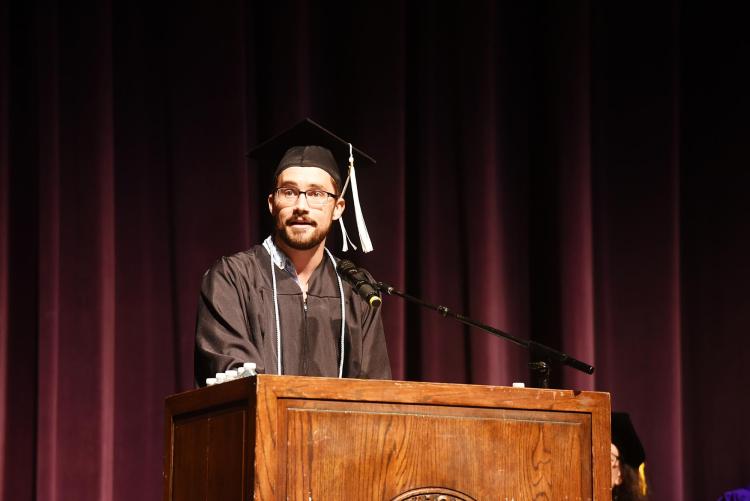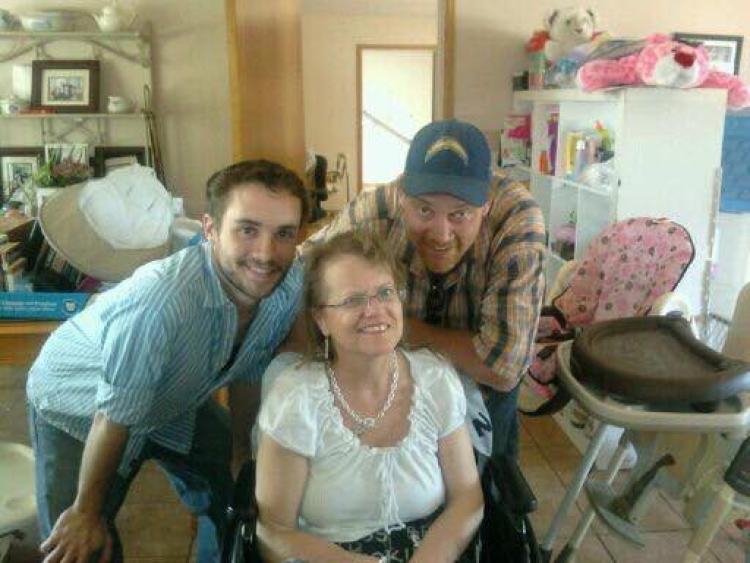Student keynote: Finding and growing your village of supports

Our 2018 teacher education graduates are dedicated to creating classrooms that support students’ passions and interests, while fostering inclusive spaces where all students learn. To celebrate our student successes, we invited two student keynote speakers to the stage, Tyler LeCroy and Ofelia Schepers.
Tyler LeCroy, also our 2018 Outstanding CU Teach Graduate, graduated from CU Boulder last fall with a degree in Molecular, Cellular and Developmental Biology. LeCroy found his passion for math and science education first at a community college and then through the Secondary Science Teacher Licensure program with the School of Education's CU Teach program. His professors praised LeCroy for crafting engaging lessons and demonstrating respect for all students by asking authentic questions about their scientific understanding. Read LeCroy's keynote speech to learn more about his journey here.
Student Keynote Speech - Tyler LeCroy
I recently had a lot of family in town to celebrate my graduation, and during our celebrations my girlfriend’s parents met my family for the first time. When my girlfriend’s mother learned that I was the first person in my immediate family to graduate high school and go to college, and she saw how supportive my family was of my education, she said, “Wow, it really took a village to get you here today!” That statement really resonated with me, and I have since thought a lot about the African proverb she was referring to: “it takes a village to raise a child.” All of us in this room were raised not just by parents or guardians, but by the village – or collection of communities we have accumulated throughout our lives.
My immediate family was my first village. My core village. The ones who saw me through infancy and nurtured me as a baby. Parents, grandparents, siblings – those people who taught me to walk and talk, to share and care, to use the potty like a big kid. This first village prepared me to enter the world and begin the journey of collecting new village members – a lifelong endeavor. So, I went on to grade school where I found friends and mentors that could support me both through my academic career and through my development into a young adult. In middle school, there were even more opportunities to add to my village. There were sports, clubs, and musical ensembles. I was able to choose which communities I wanted to try out, and some people fit into my village better than others. The ones that fit followed me into high school – one of the most important sources of new village members.
High school was packed with opportunities to explore different communities and find where I fit in. Aside from having a community of students in each class, there was a wide range of clubs and extracurricular activities in which to participate, and some life-long relationships were made. In high school I got my first part-time job, teaching me the value of hard work and adding more precious members to my village. By the end of high school, I had built a community of supports in my life without even realizing it. My friends, teachers, counselors, coworkers and classmates combined with my immediate family made up a network – a village - that I could rely on to help alleviate the growing pains of developing into an adult. Upon graduation it was time to decide where I would go next to add new members to my village. Would I go to a 4-year college? A 2-year college? Straight to work? Each of us graduating today made the decision at some point to shop for new members at CU Boulder’s School of Education, and I personally believe this institution has been one of the most important and rewarding sources of village members that I have found yet.

After my mother’s passing, I began to reflect on my life and my choices, and it was then that I realized that I wanted more out of life than just to wait tables and get by. I wanted to make a difference. I wasn’t sure what that would look like, and I had no idea where to begin, so I tried to remember a time in my life that I was truly happy, that I felt fulfilled - and I recalled my high school years. I was busy in high school. I was in band, drama and choir, and I had a great group of friends to keep me busy after school. I had a village. It dawned on me that school is not just about English, History, Math and Science. It is about self-discovery and building the village that it would take to raise me into an adult. With this realization I enrolled in classes at a local community college and began to rebuild my village. This time, I took classes that were out of my comfort zone in an effort to find new interests. Quite surprisingly, I fell in love with math and science and I met some great friends in my classes. I met with professors after class to discuss my options for the future. After a short time back in school I was finally thriving again – not just surviving. During my time at community college I realized that education is what opened up the doors to success and happiness for me. School – from elementary school to community college – gave me the opportunities I needed to access different communities of people to add to my village of supports. School also gave me the skills that I need to be successful in a competitive world. I discovered that my ultimate passion was for education itself. I knew I wanted to be a teacher.
When I came to Boulder, I transferred as a Chemical and Biological Engineering major because an Engineer’s salary looked a lot more attractive than a teacher salary (don’t act like you never considered a higher paying job!). I worked extremely hard my first year as an engineering student even though I was quite unhappy in the program. I told myself it would be worth it in the long run because I would make boatloads of money. My second year at CU, however, brought another wake-up call for me. In the Spring of 2015, my father suddenly died of a heart attack. This loss was perhaps even harder than losing my mother, and I strongly considered giving up school in the wake of his death. I felt defeated, and the thought of attempting to pass Differential Equations and Thermodynamics with this going on did not help at all. I didn’t give up, though, and probably the biggest reason I was able to continue was my village. The people who supported me during that time helped me see that my dad would want me to finish school. My friends said, “just imagine how proud he’d be to know you got your degree!” My professors at CU supported me in my classes and did everything they could to help me get through that semester. I found refuge with the grief counseling at CU and I added more valuable members to my village of supports. I chose to stay in school that semester, but I also decided to make a big change in my life. I changed my major from Engineering to Molecular Biology and enrolled in the CU Teach program because I finally understood that a paycheck is not a reason to start a career, and I knew that education was my passion. CU Teach and the School of Education have since become one of my favorite and most influential communities that I have had the privilege of being a part of, and I have added many members of this community to my own personal village.
All of us here today chose to study education because, on some level, we understand how important it is to have access to communities that can grow a person’s village. As educators, it is our work to create atmospheres that allow these relationships to flourish. The elementary teachers among us will be responsible for those early, formative years where students come to school without even realizing that they are building their villages. These teachers must constantly work to create a positive, safe, and nurturing environment where students can thrive. Secondary teachers must also learn to cultivate such an environment while balancing safety and positivity with choice and personal liberty. This responsibility reaches beyond the classroom as well, as many graduating today will go on to administration or to write curriculum and policies that will affect the growth and success of these students. We have all taken on the responsibility of giving the next generation of students the opportunity not just to survive, but to thrive using the supports available to them. As educators, we will all be influential members of countless villages, with opportunities every day to support and mentor students and colleagues. The School of Education has prepared us to do exactly that. It took a village to raise each and every one of us, and I’m both proud and grateful to have all of you in my village.
Congratulations, 2018 graduates. Let’s go make a difference in some young lives.
- Tyler LeCroy
Learn more about Tyler LeCroy in his 2018 Outstanding Graduate profile.

